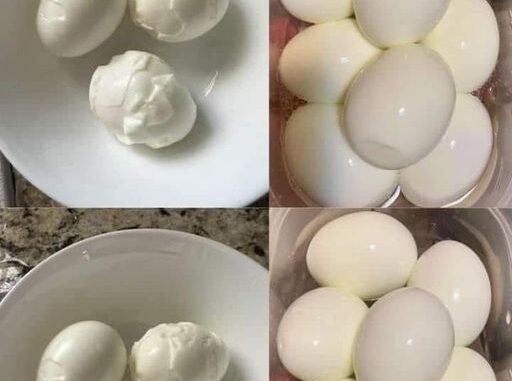
Hard-boiled eggs are a staple in many kitchens due to their versatility, nutritional benefits, and simplicity. Yet, one of the most frustrating challenges when it comes to hard-boiling eggs is peeling them perfectly. If you’ve ever ended up with a mess of jagged eggshells and torn egg whites, you’re not alone. Thankfully, French celebrity chef Jacques Pépin has shared an innovative solution that will save you time and effort, ensuring flawless results every time.
Why Do Hard-Boiled Eggs Stick to Their Shells?
The problem with peeling hard-boiled eggs lies in the air pocket inside the egg. When eggs are cooked, the air pocket expands, pressing the egg white against the shell. This can make peeling a challenge, especially with fresher eggs, where the membrane between the shell and the egg white is more intact. Without a simple modification to the cooking process, you could be stuck with stubborn shells clinging to your perfectly cooked eggs.
The Jacques Pépin Hack: A Simple Hole for Perfect Peels
Jacques Pépin, an internationally renowned chef, has introduced an incredibly easy yet effective method to combat this issue. The trick? Poke a small hole in the broad end of the eggshell before boiling it. This tiny adjustment allows the air pocket inside the egg to escape as the egg cooks, preventing the shell from sticking to the egg white. With this simple hack, peeling your eggs will become a quick and seamless process.
Step-by-Step Guide to Poking the Perfect Hole
While this may sound straightforward, there are a few key details that can make or break this technique. Follow these steps to ensure success:
- Select Your Eggs: While this hack works on eggs of any age, slightly older eggs tend to peel easier. If you’re working with farm-fresh eggs, the peeling process might still require a bit more care.
- Prepare the Tool: You won’t need any fancy gadgets. A standard pin, needle, or thumbtack will do the trick. These household items are all you need to create a tiny hole in the eggshell without cracking it.
- Poke the Hole: Hold the egg securely and use your tool to make a small hole in the broad end (the wider side) of the egg. This end contains the air pocket, and the goal is to create a pathway for the air to escape as the egg cooks.
- Handle with Care: The hole should be just large enough to allow the air out, but not so big that it causes the egg to crack. A gentle touch is crucial to maintain the egg’s structure.
Boiling the Eggs: The Key to Success
Once you’ve prepared your eggs with a small hole, the next step is cooking them to perfection. Here’s how you can ensure your eggs turn out just right:
- Boil the Water First: Start by bringing a pot of water to a rolling boil. It’s important to add your eggs after the water is boiling to control the cooking time accurately.
- Lower the Eggs Gently: Use a slotted spoon to carefully lower the eggs into the boiling water. This prevents cracking and ensures an even cook.
- Timing Is Crucial: For soft-boiled eggs, cook them for about 6 minutes. For medium-boiled eggs, aim for 8–9 minutes. For hard-boiled eggs, let them cook for 10–12 minutes. Adjust based on your preference for yolk texture.
- Ice Bath for Easy Peeling: Once the eggs are cooked, transfer them immediately to an ice water bath. This not only stops the cooking process but also helps further loosen the shells, making them even easier to peel.
Leave a Reply